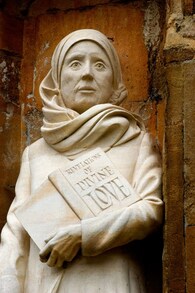
It certainly lies behind the words of the great fourteenth century mystic Julian of Norwich (see photo of her statue at Norwich Cathedral, above), who when contemplating a hazelnut wrote, In this Little thing I saw three properties. The first is that God made it, the second is that God loveth it, the third , that God keepeth it. But what is to me verily the Maker, the Keeper and the Lover – I cannot tell; for till I am substantially oned to him, I may never have full rest nor very bliss; that is to say, till I be so fastened to Him, that there is right nought that is made betwixt my God and me.’
Now the thing about Julian of Norwich is that she lived in a very trying time. War and local insurrections were frequent. More frequent – and important to our current situation – were the visitations of the plague, the Black Death. When Julian was just six years old the plague came to Norwich and within a year three quarters of the population of that prosperous city was dead, and the city itself came to a virtual standstill for three years. There were no workers to repair the roads or tend the sheep on whose wool the city relied for its trade. It took a decade to repair the damage, and then when Julian was nineteen the plague came again, this time especially affecting babies and children, and it has been suggested that Julian herself lost husband and children to the epidemic. She herself succumbed to a near fatal illness at the age of thirty and it was then that she received the Visions of Divine Love that became her life’s contemplation and the subject of the first recorded book written in English by a woman. Julian knew from first- hand experience that righteousness did not protect. She had seen death at close quarters from an early age, and yet could still write that God is our ‘keeper, our lover.’
This week I have been bemused and a little appalled by the sights in our shops. Panic buying of pasta and rice I can try to understand – put panic buying of cans of Coca Cola? And how is it that our local pharmacy can sell out of four years supply of hand sanitiser in one week? We seem to have lost faith not just in God but in our fellow human beings and racism towards our brothers and sisters from Asia is particularly apparent. Yet without trust we cannot move forward in world or church.
So, what is to be done? What are the little but vital things that we can do as individuals and as a church community to restore that trust? Refusing to listen to fear or yield to panic is a good beginning. Greeting others – even if from a small distance – with warmth and love and doing everything we can to reduce isolation will help too. My newsagent told me that his delivery boy is Australian-born Chinese and has never left Australia. Some customers have been greeting him with fear and asking him not to come near them and leave his delivery at the gate. My newsagent had taken him in his arms and embraced him and told him not to be discouraged by their hatred and fear. We too can offer such common acts of love and kindness to those under pressure at this time.
However, above all I believe Julian had it right – this is about our closeness with God. We are to seek to be ‘substantially oned’ with God, fastening ourselves to God, so there is nothing material between ourselves and God. Now that is a tall order and a lifetime’s work. Yet it is a work we begin and continue every time we breathe in and out, receiving the loving and keeping of God and breathing it out upon all surrounding us – even those finding it necessary to fill their trolleys with toilet roll. We need at every turn to meet fear with love, in the faith and confidence that love will prevail. So may we rest this and every moment in the love of the God who keeps us and all creatures. Amen.
by Penny Jones, 8 March 2020.
 RSS Feed
RSS Feed